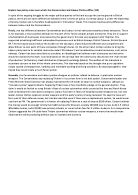Castlereagh was a man with many principles, some of which undermined his professional ideas and judgement. He was supportive of the congress system that was created in Europe, and attended many of the early congresses. Although, in 1822 when George Canning took over from Castlereagh he continued to support many of Castlereagh’s original ideas and policies he did hold very different views on Foreign policy. Canning approved of government reform and supported the needs of the working class. In contrast Castlereagh was not sympathetic to the working class and favored repression over reform, these differing views meant that the domestic government lacked continuity in 1822. In terms of foreign policy Castlereagh supported an alliance among European nations to fight for oppressed nations, but he was opposed to too much intervention into the affairs of another state, a view shared by Canning who supported a much more isolationist policy than Castlereagh.
These different personalities led to a slight turnaround in foreign policy after the death of Castlereagh in 1822. Castlereagh had believed that Britain had an international responsibility, Canning on the other hand campaigned for a more isolationist Britain because he did not want Britain to pay for foreign wars. This, along with their domestic attitudes meant Castlereagh was unpopular with the people of Britain and Canning, being more moderate was liked. This shows that personality had a major effect on the running of the country and was an important issue in foreign affairs.
In terms of policies themselves, they never changed, the congress system continued with Britain directly involved, particularly when it involved the access to British colonies and the expansion of the British Empire. In international meetings such as the congress of Vienna Castlereagh's main priority was to create peace in Europe, in both the short and long term, he did not want Britain to be dragged into European wars but did not want to completely exclude Britain from Europe. Castlereagh shared the opinions of the conservative leaders of Europe against radical political movements, and hence supported the ideas behind the Carlsbad Decrees.
The next significant Congress was not attended by Castlereagh but by his successor, Canning. This congress was set up to deal with the conflicts between Greece and Spain. Canning wanted to prevent intervention in Spain, but was unsuccessful; this was a failure in his first major attempt. Canning then went to extreme measures, and refused to co-operate with other European powers, a sign of his isolationist views, and the congress system came to an end.
Throughout his time as Foreign Minister he continued this opinion of no intervention and tried to stop French intervention in the Portuguese fiasco of 1822 and resolve the problems in South America without interference by outside states. Canning was pleased with the production of the Monroe Doctrine, which said that interference by the European powers in South America would be seen as a threat to the growing United States, following this he began to improve trade with South America.
The third influential foreign secretary in this era was Lord Palmerston, a politician with a flamboyant and abrasive character. Palmerston's main objective was to protect British interests in the world. Palmerston went on to have an important influence on European affairs, and unlike Castlereagh and Canning was prepared to take a more involved route in foreign affairs, he helped create an independent Belgium in 1830 and therefore prevented its annexation with France. It was Palmerston who was largely responsible for preventing Mehmet Ali of Egypt from seizing control of the Ottoman Empire. This increased involvement in foreign affairs led to Palmerston gaining a reputation for blustering ‘gunboat’ diplomacy. Palmerston had a very different attitude towards European affairs than his earlier predecessors.
In conclusion I feel that the personality of the Foreign Minister did have a major influence on the way that Britain acted towards foreign affairs between 1815 and 1851. On the other hand I feel that the policies also played a very important role. Particularly during the time of Canning and Castlereagh the ideas behind the policies did not change all that much, but Canning was much less sympathetic than Castlereagh and was more willing to stress the difference between liberal Britain and the conservative powers of Europe.
Policy changed very little but personality did affect it, not directly but in the way that the policies were carried out. This therefore means that both were very important in 19th Century affairs but I would say that Personality made a big difference in the three men’s approaches toward foreign affairs, and was therefore more important than the policies themselves.







